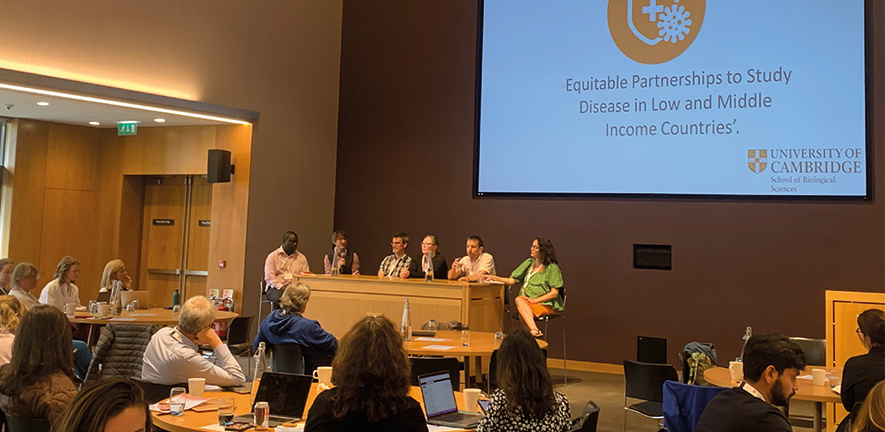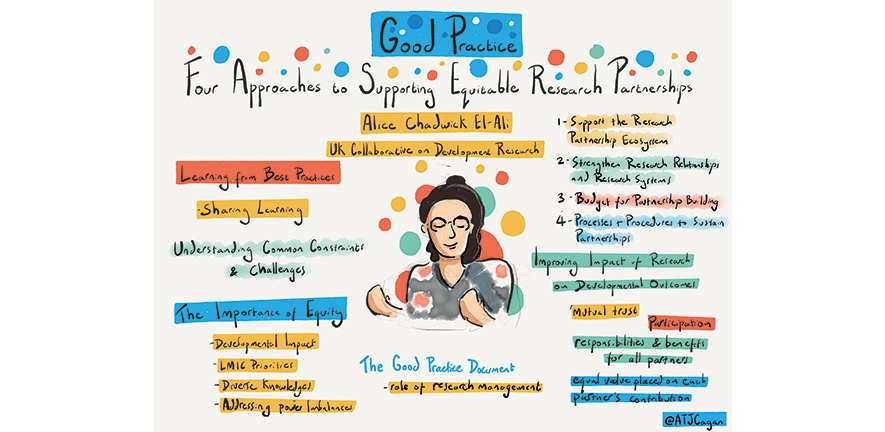
Submitted by Susana Camacho on Mon, 04/09/2023 - 17:51
University of Cambridge researchers are forming equitable partnerships with collaborators in low- and middle-income countries to advance disease research and health outcomes.
Low- and middle-income countries (LMICs) are disproportionately affected by both communicable and non-communicable diseases. Partnerships with researchers in LMICs have an important role to play in addressing this disparity and improving global health outcomes. On July 3rd, the University of Cambridge’s School of Biological Sciences held a symposium to highlight best practices to make sure that these partnerships are fair and beneficial for both sides. “We want to provide guidance in terms of what constitutes best practice when you're doing research as an equitable partnership,” said Stephen Graham, Professor in the Virology Division of the Department of Pathology, in his opening comments at the symposium.
Equitable partnerships are built on mutual trust and participation, and both sides share benefits and responsibilities. What this looks like in practice is very different for each collaboration, explained symposium keynote speaker Alice Chadwick El-Ali from the UK Collaborative on Development Research. “This is why time, respect and awareness are needed to develop those strong equitable research partnerships,” she said, “especially where there's a resource and power asymmetry between the different partners.”
The symposium was part of a larger effort by the School of Biological Sciences to engage researchers with new ways to collaborate and connect with people who are impacted by their research. During the event, eleven researchers from different departments shared how they formed equitable partnerships with LMIC researchers. One of them was Francis Wamonje, research leader in entomology at the National Institute of Agricultural Botany (NIAB). “I believe that equitable partnerships need to have equitable outcomes in mind,” he said in his talk. “And this only starts when your research topics that are important to the countries that are involved.” Wamonje collaborated with researchers in Ghana to identify which insects were affecting indigenous eggplant crops, which can then inform the best ways to handle pest control and secure harvests.
Suzanne Turner, Professor of Childhood Cancer Biology in the Department of Pathology, collaborated with researchers at the Uganda Cancer Institute to study Burkitt’s Lymphoma. This cancer affects children in different ways depending on whether they have the sporadic or endemic form of the disease. In the UK, the sporadic form is more common, whereas Uganda mostly sees the endemic form. By forming an equitable partnership, the researchers kept both forms of the disease at the forefront. “We’re working together with a common goal,” Turner said. “We all benefit from this research – not only children in high-income countries, but also children in low- and middle-income countries, and we very much need to address their specific issues and tailor our research towards that.”
Representatives from several initiatives at the University of Cambridge also spoke at the symposium to share how they help researchers overcome some of the challenges they might encounter when setting up equitable partnerships. For example, Sara Serradas O’Holleran of Cambridge Global Challenges emphasised the time it takes for research partners to build trust, get to know and understand each other, and each other’s motivations. “This is not done overnight” said Serradas O'Holleran. “It’s difficult to match the duration of these long-term partnerships that are based on trust with some of the deadlines we face.” She added that Cambridge Global Challenges provides resources and knowledge from previous successful partnerships to help researchers make connections faster.
With several other initiatives and researchers sharing their insights throughout the afternoon, Stephen Graham is encouraged by the response to the symposium. “It was really inspirational to see how colleagues at all career stages have formed equitable partnerships with LMIC partners to undertake disease research with real-world impact,” he says. “I hope this event will stimulate more colleagues to engage with overseas partners to tackle disease, supported by the Cambridge initiatives that spoke today.”



